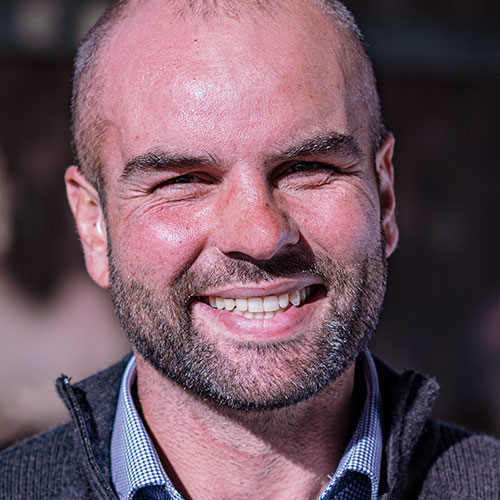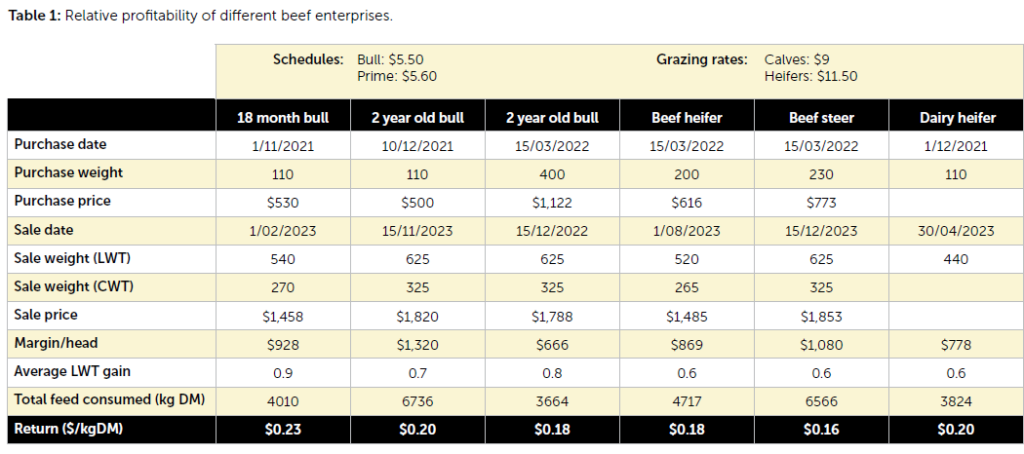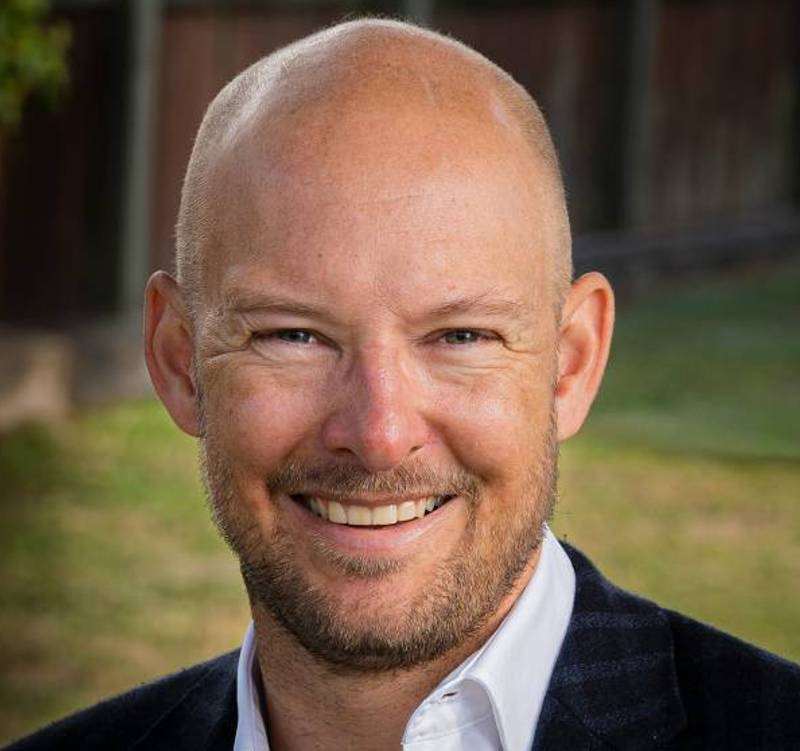
03 Jun The Dairy Beef Opportunity
This article was originally published in Country-Wide Magazine in May 2022
Beef finishers have the opportunity to cash in on the dairy industry’s supply of bulls, writes Perrin Ag Consultant Dwayne Cowin.
Despite 100kg dairy beef calves falling out of favour with beef finishers over the past couple of years, an 18-month bull finishing policy remains one of the most profitable livestock trading enterprises within drystock operations.
Success of this enterprise, though, is based on the requirement for the bull to achieve an average daily liveweight gain of 0.9kg/day over its lifetime on farm.
While the financial performance of the 18-month bull finishing enterprise still consistently outperforms other beef finishing and/or dairy support enterprises, there seems to be recent apprehension for beef finishers to buy 100kg calves in the spring for the following reasons:
- Summer rainfall is becoming more variable and less predictable, irrespective of farm location
- The hotter summer temperatures; and/or
- The increasing level of breeding stock performance in general over most farms, therefore most farmers are carrying more stock over summer (i.e. finishing lambs) and placing additional feed pressure on a variable feed supply.
Despite the above, opportunities for supply of dairy beef calves are increasing, with the dairy industry showing increasing awareness around the sensitivity of on-farm euthanasia and selling bobby calves.
Relative profitability of bull finishing
One would hope the financial performance of farming bulls would make up for the common pain points associated with farming them. These are the increased management complexity with having to farm more mobs, the potential for increased R&M costs and the strategically left ‘bull holes’ they tend to leave behind around troughs, gateways, gullies etc.
Table 1 shows analysis comparing an 18-month bull finishing enterprise to other livestock finishing and/or dairy support enterprises on a dollars per kilogram of drymatter (DM) consumed basis.
As Table 1 shows, the 18-month bull finishing policy still has the ability to generate the strongest financial returns on a cents per kg DM basis at 23 cents per kilogram of drymatter eaten. The 18-month bull policy also has the potential to deliver high per hectare returns. For example, assuming a bull wintering stocking rate of 2.2 bulls per hectare, a gross trading margin of $2040/ha ($928 x 2.2) can be generated from a livestock class that only has to be wintered once.
The bull policy also generally fits well with seasonal pasture growth, where the calves are bought in spring as pasture growth rates are lifting, and the older bulls are sold in the summer/autumn when pasture growth rates decline again.
The bulls are generally wintered at a lower stocking rate, therefore have a lower feed demand per hectare, and generally this aligns with the lowest pasture growth rate period of the year.
Successful bull finishing
The biggest determinant of success for the 18-month bull finishing enterprise is the requirement for the bull to achieve an average lifetime liveweight gain on-farm of 0.9kg/day.

Table 2 shows the required target LW and subsequent gains at six key periods for a spring-born bull, from entry into the bull finishing system through to sale to the works.
While achieving the lifetime target LW gain of 0.9kg/day is pushing towards top end performance requirements, failure to do so can have the following implications on the bull finishing and/or overall farming system:
- The bulls have to be retained longer into autumn or early winter to achieve the target sale weight (which could place additional pressure on the feed budget)
- The bulls have to be sold lighter at the same target sale date (thus reducing the profitability of the enterprise)
- The bulls do not achieve a finished target sale weight, and they either have to be sold store or retained for a second winter. These bulls normally get caught in a ‘no-man’s land’ of about 450kg LW, and are at a weight of being ‘too big to sell store or winter again’, yet ‘too small to finish’.
Conversely, achieving a lifetime LW gain average above the 0.9kg/day means bulls can either be:
- Sold earlier at the same target sale weight, or
- sold heavier at the same target sale date.
For example, lifting lifetime average LW gain to 1.0kg/day means the bulls could be sold one month earlier at the same sale weight (and would lift the cents/kg DM return to 25 cents/kg DM); or be sold an extra 15kg CW heavier at the same sale date (and would earn an extra $81/head based on the heavier sale weight).
Successful 18-month bull farmers
Based on the average LW gain of 0.9kg/day, most aspects of the farming calendar need to go ‘right’ for this to be achieved. While it may be easy to simply work out the required LW gains based on when the bulls are targeted to be bought and sold, many farmers struggle to pull off the required target gains.
But there are a number of common themes amongst successful farmers who achieve at or above these target LW gains and operate a successful bull beef finishing enterprise. These include:
- Setting up a bull finishing system which allows individual bull wintering rotations with mobs of between 25 to 40 bulls, at a stocking rate of 2.0 to 2.4 bulls per hectare
- Having a discipline or the ability to pay attention to detail on all aspects of the bull finishing enterprise;
- Ensuring replacement bull calves are well-weaned and on-farm at a minimum of 110kg on or before November 1 annually
- Ensuring “feed quality is king” particularly over the first summer as bull calves – and having either a ‘good natural eye’ or robust grazing plans to achieve high quality feed in the required quantities are available. This will ensure target LW gains are achieved
- Having a regular weighing and monitoring programme to assess actual LW gains
- Having the skillset and ability to make timely decisions if LW gains are below target, and potentially sell other stock classes earlier, or delay other planned purchases
- Potentially providing supplements if the animals drop below target LW gains due to pasture quality or quantity limitations
- Having a well-executed animal health plan, so the bulls are never ‘checked’
- Having an average May 1 bull LW of over 256kg heading into winter
- Having a May 1 average pasture cover target of over 2000kg DM/ha
- Ensuring the bulls still grow at 0.8kg/day over winter
- Having an average November 1 bull LW of over 445kg
- Potentially selling tail end bulls that are not going to reach the end target LW by March 1 as store bulls in November
- Potentially killing bulls lighter than target over summer to ensure the calves maintain their target LW gains.
Despite what may seem like an exhaustive list of traits for the bull finishing system to be successful, an increasing opportunity exists to leverage off the dairy industry and implement a highly profitable finishing enterprise into most dry stock operations.
The profitability of 18-month bull finishing continues to outperform other beef finishing enterprises due to its high conversion of feed inputs into finished product. Also, running a relatively low wintering stocking rate (yet generating high financial returns) also presents other advantages, including a lower environmental footprint (especially compared to wintering older cattle, and achieving lower LW gains).
But just remember ‘feed quality is king’, and every day needs to be a growing day for the bulls in order for the farmer to realise the relative success of the enterprise profitability.



